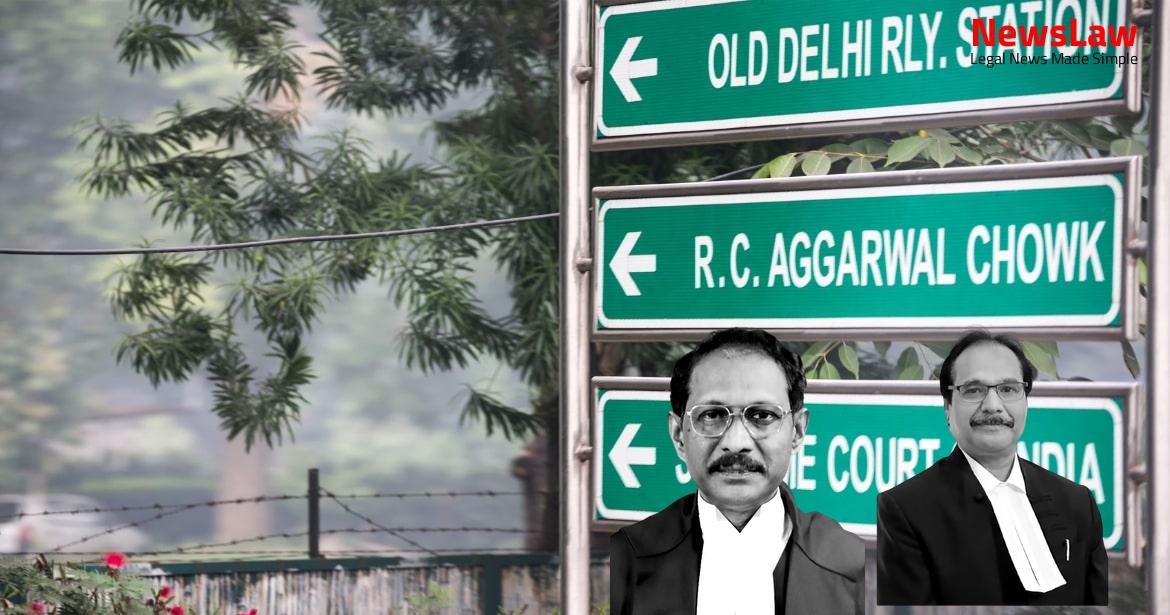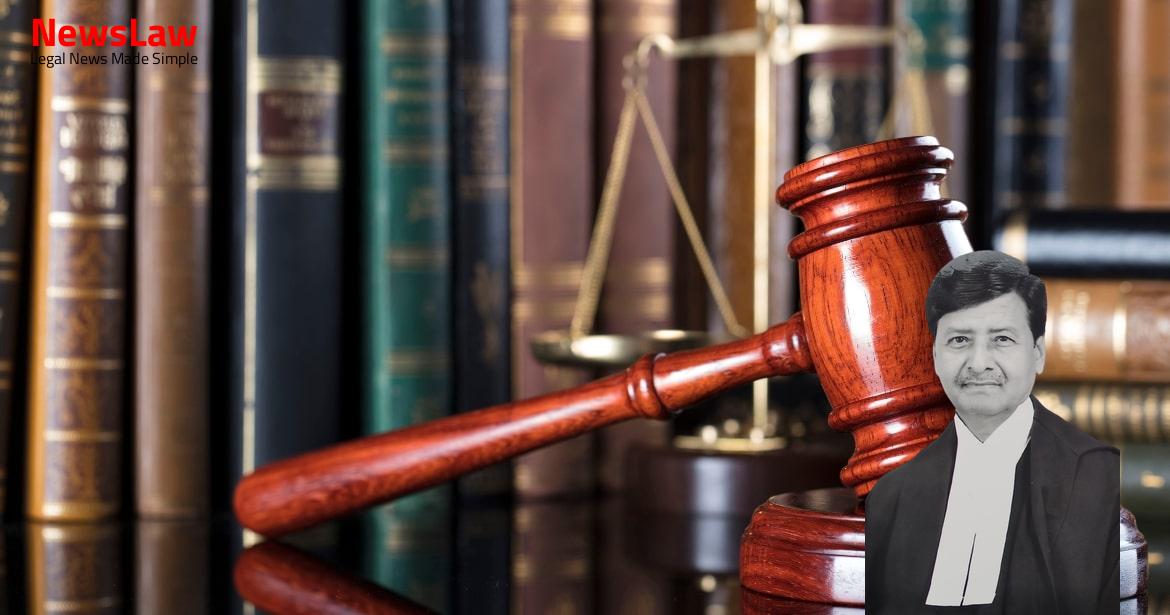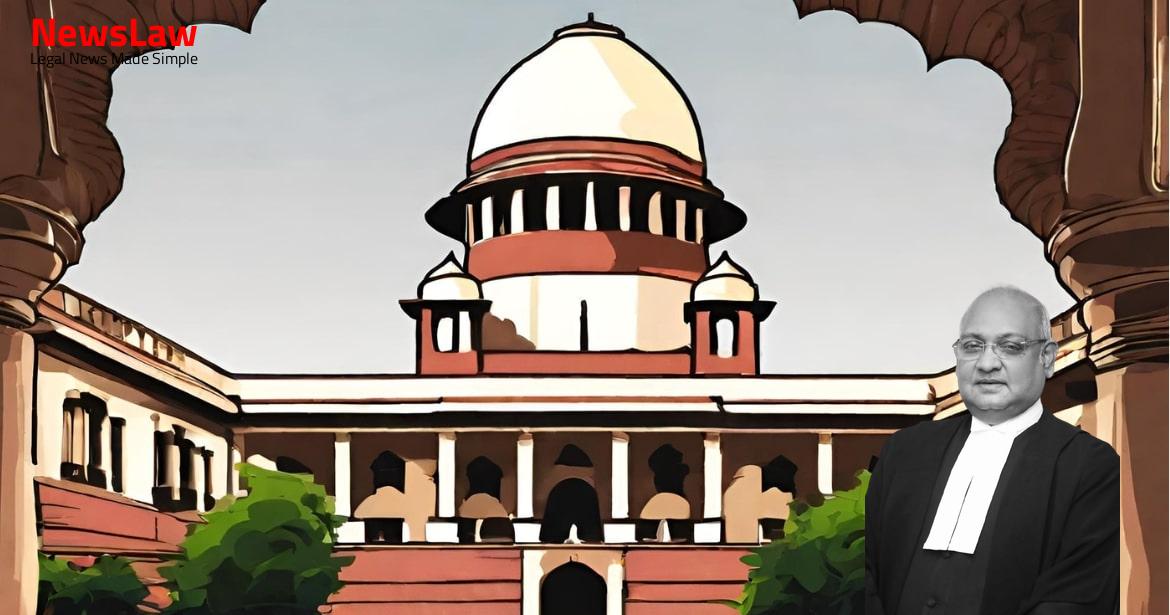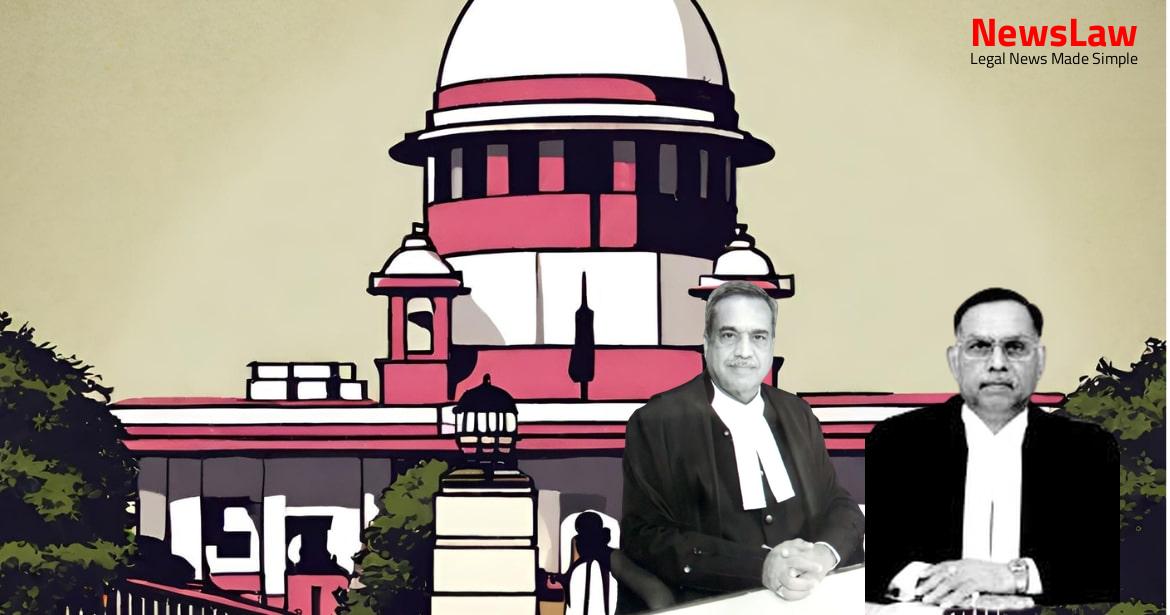A landmark judgment was delivered by the Supreme Court of India, granting acquittal in a pivotal conviction case. The case involved critical legal proceedings and raised important questions regarding fair trial procedures. The Court’s decision marks a significant milestone in the legal journey of the individuals involved. Stay informed about this important legal development.
Facts
- The appellant’s conviction under Section 302, IPC, with the aid of Section 34, IPC, was challenged.
- Incident stemmed from an argument over spilling water on the appellant’s roof while cleaning the parapet.
- Accused’s wife hurled abusive words at the deceased’s sister, leading to a confrontation.
- Necroscopic evidence and witness testimonies described the events leading to the deceased’s homicidal death.
- Deceased confronted the appellant, leading to the appellant inciting his brother to attack.
- Brother stabbed the deceased with a knife multiple times, followed by the appellant joining in the abuse.
Also Read: The Sentencing Dilemma: Supreme Court’s Decision in the Case of Attempted Murder Conviction
Arguments
- Appellant raised contention for the first time before the Court without evidence of raising it before the High Court.
- Ground No.13 was raised in the appeal before the High Court regarding the improper examination of the appellant under section 313 Cr.P.C.
- No specific details establishing prejudice were argued before the High Court regarding the non-compliance of Section 313, Cr.PC.
- The appellant’s conviction was confirmed under the impugned judgement dated 20.12.2016 in Criminal Appeal No.540/2000 and Criminal Appeal No.764/2000.
- Counsel for both the appellant and the State were heard during the proceedings.
Also Read: Landmark Supreme Court Judgment on Delayed Possession of Flats
Analysis
- In the appeal, crucial incriminating circumstances were not put to the appellant during examination under Section 313, Cr.PC.
- The failure to question the appellant on incriminating circumstances deprived him of an opportunity to explain, potentially causing material prejudice.
- The appellant had already served more than 10 years in incarceration by the time of the appeal.
- Given that the incident occurred more than 29 years ago, the entire trial against the appellant was deemed vitiated.
- The mandatory procedure of questioning under Section 313, Cr.PC is essential to enable the accused to address incriminating evidence.
- The failure to question the accused on incriminating circumstances may result in a miscarriage of justice and vitiate the trial.
- The conviction was not solely under Section 302, Cr.PC, but also involved another aspect that contributed to the decision.
- The omission of questioning the appellant on certain incriminating circumstances was a clear defect in the trial process.
- The appellant was materially prejudiced by the non-questioning on crucial incriminating circumstances, leading to a miscarriage of justice.
- The High Court judgment did not specify a discussion or consideration of the issue, potentially indicating that it was not properly argued.
- The failure to comply with the mandatory questioning procedure may vitiate the entire trial if it prejudices the accused.
- The incriminating circumstances not put to the appellant were foundational to his conviction under Section 302, IPC with the aid of Section 34, IPC.
- The arguments in the appeal focused on the failure to question the appellant on key incriminating evidence.
- The absence of material showing the core contention was raised and argued before the High Court raised doubts on the legitimacy of the trial process.
- The non-examination or inadequate examination of the accused under Section 313, Cr.PC must be proven to cause material prejudice to be deemed a vitiation of the trial.
- The onus to establish prejudice or miscarriage of justice due to non-questioning on incriminating evidence rests on the convicted individual.
- The lack of clarity on the incriminating circumstances not questioned during the appellant’s examination raised questions on the appeal’s grounds.
- The failure to examine the accused on crucial incriminating circumstances may not automatically invalidate the conviction unless it results in prejudice.
- The Court acknowledged the need for procedural safeguards to protect the rights of accused individuals facing serious charges like murder.
- The appeal did not explicitly raise the issue of non-examination of incriminating circumstances against the appellant before the High Court.
- The Court emphasized the importance of proper questioning under Section 313, Cr.PC to ensure a fair trial and dispense justice effectively.
- It is crucial to examine the accused under Section 313, Cr.PC, as it provides an opportunity for the accused to explain incriminating circumstances and present their own version of events.
- Non-examination or inadequate examination under Section 313, Cr.PC, may not necessarily invalidate a trial unless it causes material prejudice or miscarriage of justice.
- The Trial Court is mandated to specifically, distinctly, and separately question the accused about each material circumstance that the prosecution relies on for seeking conviction.
- Failure to question the accused about material circumstances can be considered a serious irregularity and should be avoided by the Court.
- The act of court shall prejudice no one – this principle (‘actus curiae neminem gravabit’) must also be considered in the context of examining the accused and conducting a fair trial.
- The Court has the authority to question the accused at any stage of the trial without prior warning.
- The Court must question the accused after the prosecution witnesses’ examination and before the accused presents their defense.
- In a summons-case where the accused’s personal attendance is dispensed with, the examination under clause (b) may also be dispensed with.
- The answers provided by the accused during questioning may be considered in the trial and can be used for or against the accused in any other offense.
- The Court can seek assistance from the Prosecutor and Defense Counsel in formulating relevant questions for the accused.
- Filing a written statement by the accused can be deemed as compliance with this section.
- The appellant had already undergone over 12 years of incarceration for an incident that occurred more than 29 years ago.
- It was deemed that subjecting the appellant to examination under Section 313, Cr.PC, would cause further prejudice due to the patent illegality that occurred in the case.
- The conviction of the appellant was not considered sustainable given the circumstances.
- The observation made in this judgment should not be taken as confirmation of the appellant’s conviction, as it may be a matter dealt with in a potential appeal.
- Due to the above conclusions, it was deemed unnecessary to address the numerous grounds raised by the appellant, as it could adversely affect the co-accused whose appeal was also decided under the common judgment.
Also Read: Enhancement of Sentence in the Case of Bigamy: Appellant vs. Accused Nos. 1 and 2
Decision
- The appellant’s challenge of the trial Court and High Court judgments have been successful.
- If the appellant’s detention is not necessary for any other case, he should be released immediately.
- The appeal has been allowed on specific terms.
- The appellant has been acquitted of the alleged offenses.
- This judgment does not affect the conviction of other accused individuals.
Case Title: NARESH KUMAR Vs. THE STATE OF DELHI (2024 INSC 464)
Case Number: Crl.A. No.-001751-001751 – 2017



